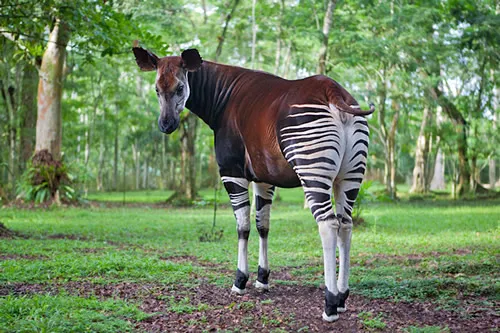The government of the Democratic Republic of Congo is again under fire for its environmental policies, which are not very green. For months, environmentalists and scientists have been contesting his concessions plan for the exploration and extraction of gas and oil in the Cuvette Centrale rainforest, in the Congo Basin.
Now, two other environmental organizations denounce that the expansion of gold mines is destroying stretches of pristine rainforest in the Okapi Nature Reserve, a UNESCO World Heritage Site, in the province of Ituri in the north-east of the country. Province that has been under a state of siege, therefore governed by the military, since May 6, 2021.
Research conducted by the Council for Environmental Defense through Legality and Traceability (Codelt) and the regional NGO Acedh prove the expansion of mining activities in the 13,000 square kilometers of forest where these activities are prohibited.
Images document that miners are digging jungle areas along the Ituri River that flows through the southern part of the reserve, habitat, among others, of protected animals as endangered, such as the okapi, the forest giraffe, of of which fewer than 50,000 specimens remain in the wild, and forest elephants and chimpanzees.
The threat, according to the NGOs, does not only concern the devastation of the precious ecosystem caused by mining activities, but also by those linked to other related human activities, such as poaching. In particular, they accuse miners of hunting protected species for food and trading okapi skins and elephant tusks.
The indictment is the Chinese company Kimia Mining, which had already been at the center of a report by a group of UN experts in 2016 for violating the ban on river dredging in the province of Ituri and other mining regulations.
And then, again, in 2021, when Greanpeace Africa, together with 205 local NGOs, asked the government to withdraw the mining concessions of the Chinese company right inside the Okapi nature reserve.
This clearance of forests by ministers who are supposed to protect them must stop, for the sake of forest communities, nature and the climate.
Appeals not only unheard, but even mocked, notes the Codelt, highlighting how the ongoing environmental destruction contrasts with the image built by the government of the DR Congo which instead promotes itself internationally as one of the main actors in the global fight against change. climate, thanks to its majority share of the rainforest of the Congo Basin, the second green lung of the planet.
Which is not the only ecosystem threatened by the expansion of mining, which is increasingly invasive globally.
This is denounced by an accurate study published in September in the Proceedings of the National Academy of Sciences, which points the finger at the lack of environmental protection laws and laxity in their application.
According to the study, the expansion of mining activities in forest areas accounted for approximately 47% (3,264 square kilometers) of the loss of tropical forests over the past 20 years (2000-2019), with African countries such as Ghana, Ivory Coast, Tanzania and Zimbabwe which suffered a direct loss of forests due to industrial extraction.
Which, added to the other factors, always human, leads Africa to lose 4 million hectares of its, and ours, forest heritage every year.
References:
https://www.pnas.org/doi/full/10.1073/pnas.2118273119
https://www.okapiconservation.org/the-reserve/
https://www.ecowatch.com/endangered-okapi-reserve-threatened-human-activity.html







